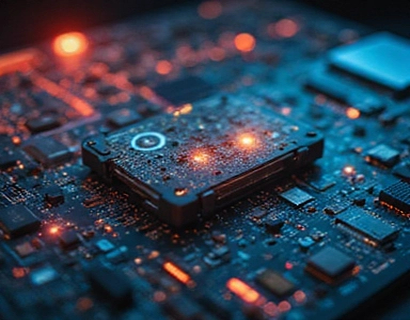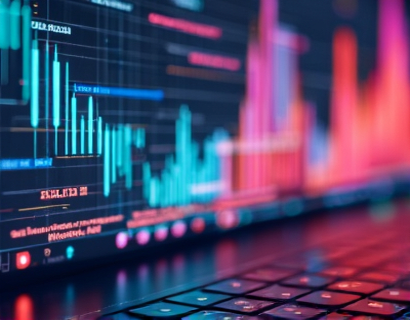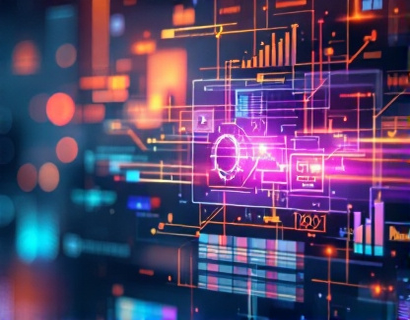AI and Crypto Synergy: Elevating Digital Finance with Intelligent Solutions for the Future
The intersection of artificial intelligence (AI) and cryptocurrency is redefining the landscape of digital finance. This synergy is not just a trend but a transformative force that is reshaping how we perceive, interact with, and utilize financial technologies. As we delve into this topic, it's essential to understand the foundational elements of both AI and cryptocurrency, and how their convergence is paving the way for a more intelligent, secure, and efficient financial ecosystem.
Understanding AI in Finance
Artificial intelligence, a branch of computer science, involves the development of algorithms and systems that can perform tasks requiring human intelligence, such as learning, reasoning, and self-correction. In the context of finance, AI is leveraged to analyze vast amounts of data, identify patterns, make predictions, and automate complex processes. This capability is particularly valuable in a domain as data-intensive as finance, where speed and accuracy are paramount.
One of the primary applications of AI in finance is in algorithmic trading. AI-driven trading algorithms can process and analyze market data in real-time, executing trades at optimal moments to maximize profits and minimize risks. These algorithms can adapt to changing market conditions, a task that would be nearly impossible for human traders to manage efficiently.
Cryptocurrency: A Brief Overview
Cryptocurrency, a digital or virtual currency secured by cryptography, operates on a decentralized network, typically a blockchain. The most well-known cryptocurrency is Bitcoin, but there are thousands of others, each with unique features and use cases. Cryptocurrencies offer several advantages over traditional fiat currencies, including enhanced security, transparency, and the ability to conduct peer-to-peer transactions without intermediaries.
The decentralized nature of cryptocurrencies means that they are not controlled by any single entity, reducing the risk of censorship and manipulation. This has made cryptocurrencies an attractive option for individuals and businesses seeking financial freedom and privacy. However, the volatility and regulatory uncertainties surrounding cryptocurrencies have also posed significant challenges.
AI in Cryptocurrency: Enhancing Security and Efficiency
The integration of AI into cryptocurrency systems is revolutionizing various aspects of the space. One of the most critical areas is security. Cryptocurrency exchanges and wallets are prime targets for cyberattacks, and AI can significantly enhance security measures. Machine learning algorithms can detect and prevent fraudulent activities by analyzing transaction patterns and identifying anomalies in real-time. This proactive approach to security helps protect users' assets and builds trust in the cryptocurrency ecosystem.
Beyond security, AI is improving the efficiency of cryptocurrency networks. For instance, AI can optimize blockchain consensus mechanisms, reducing the computational power required for validating transactions. This not only lowers operational costs but also makes the network more scalable and environmentally friendly. AI-driven solutions can also streamline smart contract execution, ensuring that conditions are met accurately and efficiently, thereby reducing the risk of errors and disputes.
Intelligent Investment Strategies
AI is also transforming the way investors approach cryptocurrency markets. Traditional investment strategies often rely on fundamental and technical analysis, but these methods can be limited by human biases and the sheer volume of data available. AI algorithms can process and analyze vast datasets, including historical price data, news articles, social media sentiment, and even macroeconomic indicators, to generate insightful investment recommendations.
One of the key benefits of AI in investment is its ability to identify trends and patterns that may not be immediately apparent to human analysts. This can lead to more informed decision-making and potentially higher returns. Additionally, AI can help manage risk by continuously monitoring market conditions and adjusting investment strategies accordingly. This level of automation and precision is particularly valuable in the volatile cryptocurrency market.
Personalized Financial Services
The synergy between AI and cryptocurrency extends to personalized financial services. AI can analyze an individual's financial data, preferences, and goals to provide tailored investment advice and portfolio management solutions. This personalized approach ensures that investors receive recommendations that align with their unique circumstances, enhancing the overall investment experience.
For example, AI-powered robo-advisors can create and manage customized investment portfolios, rebalancing them as needed to maintain the desired asset allocation. These platforms can also offer real-time insights and alerts, keeping investors informed about market movements and potential opportunities or risks. This level of personalized service is particularly beneficial for retail investors who may lack access to professional financial advisors.
Decentralized Finance (DeFi) and AI
Decentralized Finance (DeFi) is an emerging sector within the cryptocurrency space that aims to create financial systems without central authorities, using blockchain technology. AI plays a crucial role in enhancing the functionality and accessibility of DeFi platforms. For instance, AI can improve credit scoring models in decentralized lending, assessing borrower creditworthiness based on alternative data sources such as social media activity, transaction history, and more.
AI-driven oracles can also bridge the gap between on-chain and off-chain data, providing accurate and timely information to smart contracts. This ensures that DeFi protocols operate smoothly and securely, even in complex scenarios involving multiple assets and parties. Furthermore, AI can enhance liquidity management in DeFi, optimizing the allocation of funds to maximize yields and minimize risks.
Challenges and Considerations
While the potential benefits of AI in the cryptocurrency space are significant, there are also challenges and considerations that must be addressed. One of the primary concerns is the regulatory environment. The intersection of AI and cryptocurrency operates in a relatively uncharted legal territory, with varying regulations across different jurisdictions. Ensuring compliance and navigating the regulatory landscape is crucial for the sustainable growth of AI-enhanced financial solutions.
Another challenge is the ethical use of AI. As with any powerful technology, there is a risk of misuse, such as the creation of malicious bots or the manipulation of markets through AI-driven trading. It is essential for developers and regulators to establish guidelines and best practices to prevent such abuses and maintain the integrity of the financial system.
Technical challenges also exist, particularly in terms of data quality and accessibility. AI algorithms rely heavily on high-quality, relevant data to function effectively. In the cryptocurrency space, data can be fragmented and difficult to obtain, which can limit the performance of AI models. Addressing these data-related issues is crucial for the successful implementation of AI in finance.
Future Prospects
The future of AI and cryptocurrency synergy holds immense potential. As AI technologies continue to advance, we can expect even more sophisticated applications in the financial sector. For instance, the development of quantum computing could revolutionize AI capabilities, enabling even more complex and efficient data processing. This could lead to breakthroughs in areas such as cryptography, further enhancing the security of digital currencies.
Moreover, the integration of AI with other emerging technologies, such as the Internet of Things (IoT) and 5G networks, could create a more interconnected and intelligent financial ecosystem. IoT devices can provide real-time data inputs, while 5G can facilitate faster and more reliable data transmission, creating a seamless and responsive financial environment.
In conclusion, the synergy between AI and cryptocurrency is not just a technological curiosity but a transformative force that is reshaping the future of digital finance. By leveraging the strengths of both domains, we can create more secure, efficient, and personalized financial solutions. As the technology evolves, it is essential for stakeholders to collaborate and address the challenges head-on, ensuring that the benefits of this synergy are realized for the broader financial community.










































